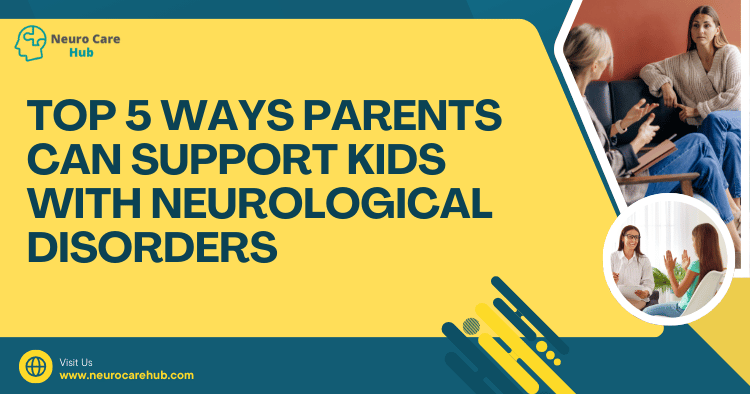Table of Contents
- Understanding Neurological Disorders
- Creating a Supportive Home Environment
- Advocating for Educational Support
- Encouraging Therapeutic Interventions
- Fostering Emotional and Social Well-Being
Understanding Neurological Disorders
Neurological disorders can significantly impact various aspects of a child’s life, including movement, coordination, learning, and behavior. Conditions like Autism Spectrum Disorder, ADHD, Cerebral Palsy, and Epilepsy fall under this category. Understanding these disorders is crucial for parents as it lays the foundation for effective support.
Understanding your child’s condition is the first step towards providing them with the right care.
FAQs:
- What are the common signs of neurological disorders?
Signs can vary widely but may include difficulties with movement, communication challenges, learning disabilities, and behavioral issues. - Where can I find more information?
For comprehensive details on neurological disorders, visit the National Institute of Neurological Disorders and Stroke.
Creating a Supportive Home Environment
A nurturing home environment can significantly impact a child’s development and well-being. Here are some ways to create that supportive atmosphere:
1. Establish Routines
Children with neurological disorders often thrive on predictability. Establishing a daily routine can help them feel secure and reduce anxiety.
Consistency is key! A structured environment can provide the comfort children need.
2. Modify the Living Space
Consider making adjustments in your home to accommodate sensory sensitivities. This may include creating a quiet corner for relaxation or using soft lighting.
3. Encourage Independence
Provide opportunities for your child to develop skills that foster independence, such as dressing themselves or helping with chores.
Visual Element: Home Environment Modifications
| Modification | Purpose |
|---|---|
| Quiet Corner | For relaxation and sensory breaks |
| Visual Schedules | To aid in understanding routines |
| Adjustable Lighting | To accommodate sensory sensitivities |
Advocating for Educational Support
Navigating the educational system can be challenging for parents of children with neurological disorders. Here’s how to effectively advocate for your child:
1. Know Your Rights
Familiarize yourself with special education laws, such as the Individuals with Disabilities Education Act (IDEA), to ensure your child receives the support they are entitled to.
Knowledge is power! Understanding your rights can make a world of difference in accessing the necessary support.
2. Collaborate with Educators
Build a relationship with your child’s teachers and support staff. Regular communication can help you stay informed about your child’s progress and any necessary adaptations.
3. Utilize Individualized Education Plans (IEPs)
Develop an IEP that outlines specific goals and accommodations for your child. This personalized approach can help maximize their educational experience.
FAQs:
- What resources are available for navigating educational support? The U.S. Department of Education provides resources and guidance for parents.
Encouraging Therapeutic Interventions
Therapeutic interventions can play a vital role in helping children with neurological disorders reach their potential. Here are a few to consider:
1. Occupational Therapy
This therapy focuses on improving daily living skills and sensory processing, helping children become more independent.
Therapies are not just treatments; they are pathways to independence and confidence.
2. Speech Therapy
If your child struggles with communication, speech therapy can provide essential tools for expression and comprehension.
3. Physical Therapy
For children with motor difficulties, physical therapy can enhance strength, coordination, and overall physical functioning.
Visual Element: Benefits of Therapeutic Interventions
| Therapy Type | Benefits |
|---|---|
| Occupational Therapy | Improved daily living skills |
| Speech Therapy | Enhanced communication abilities |
| Physical Therapy | Increased strength and mobility |
Fostering Emotional and Social Well-Being
Supporting your child’s emotional and social development is as important as addressing their physical and educational needs. Here are some ways to foster this aspect of their life:
1. Encourage Social Interactions
Facilitate playdates and group activities, allowing your child to build friendships in a supportive environment.
Social skills are built through practice! Provide your child with opportunities to engage with peers.
2. Teach Emotional Regulation
Help your child understand and express their emotions. This can be achieved through role-playing or using visual aids like emotion charts.
3. Seek Professional Support
Engage with therapists or counselors who specialize in working with children with neurological disorders. They can provide tailored strategies to help your child navigate social situations.
FAQs:
- How can I help my child make friends? Encourage participation in activities they enjoy, and teach social skills through guided interactions.
- Where can I find emotional support resources? Websites like Mental Health America offer valuable resources for parents.
Supporting a child with a neurological disorder can be challenging, but with love, understanding, and the right strategies, you can make a significant difference in their life. Remember, you’re not alone on this journey—numerous resources and communities are available to provide support. Embrace the challenges and celebrate the victories along the way!
Every small step counts. Celebrate the little victories as they lead to significant progress!
Also Look For:
For more insights on supporting children with neurological disorders, consider reading about the Top 5 Essential Insights on Neuro Care You Need to Know and Top 5 Benefits of Early Intervention in Neuro Care. These resources can provide additional guidance on creating a supportive environment and understanding the importance of early intervention in neuro care.






